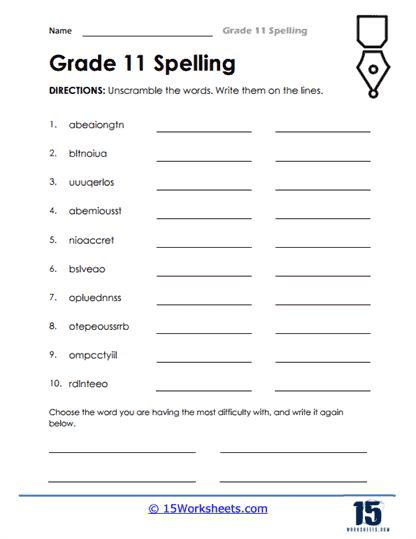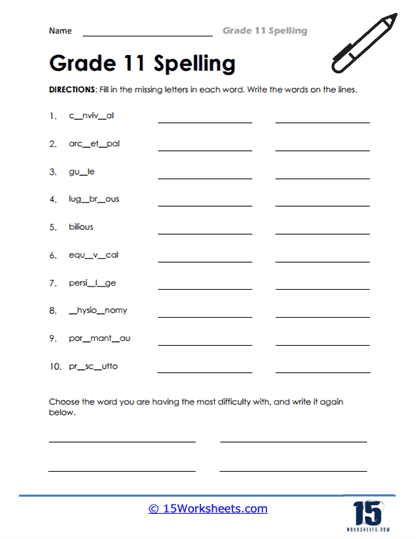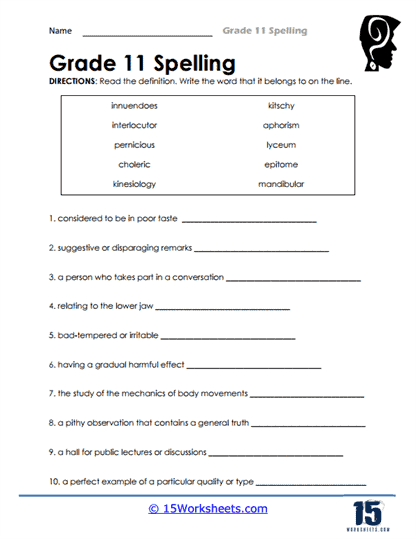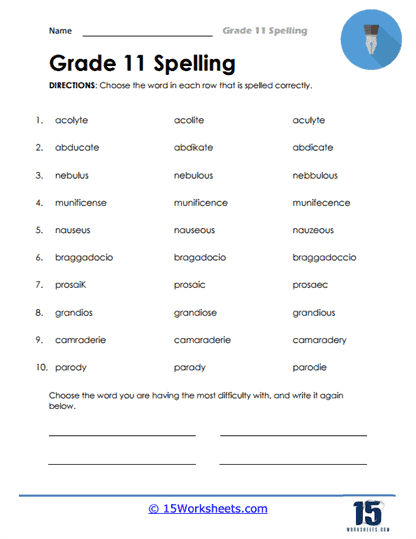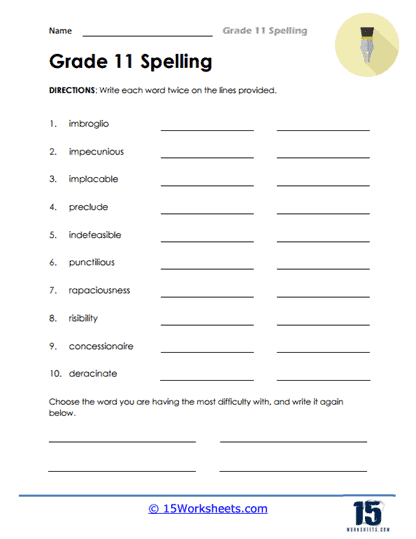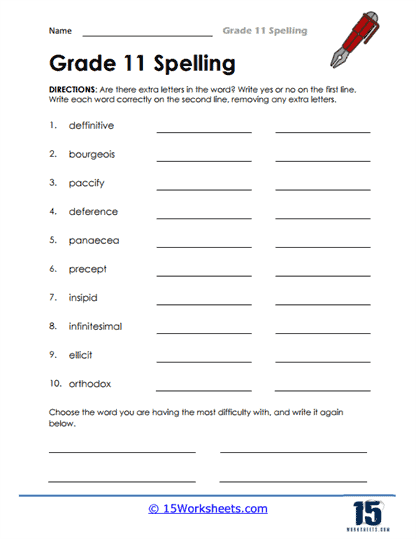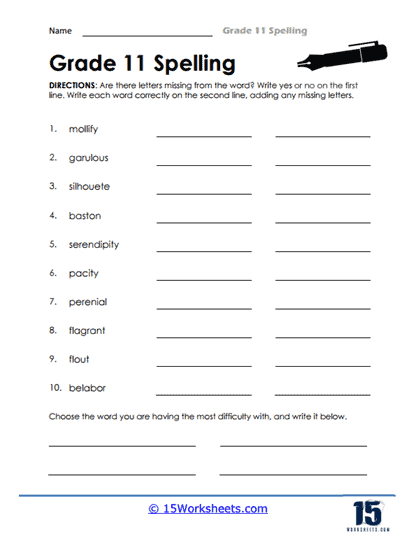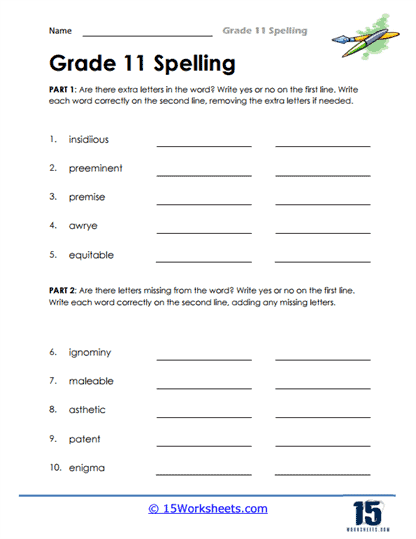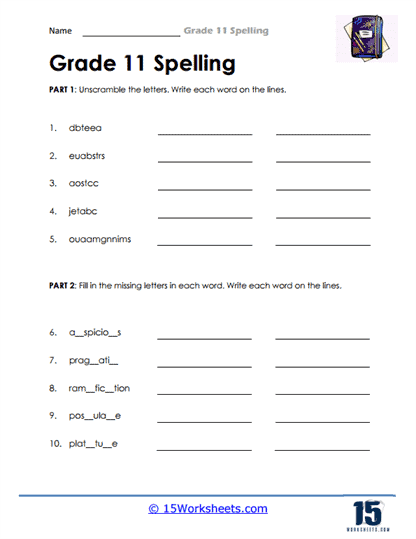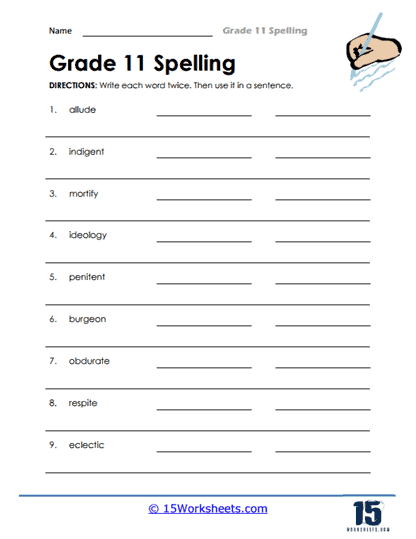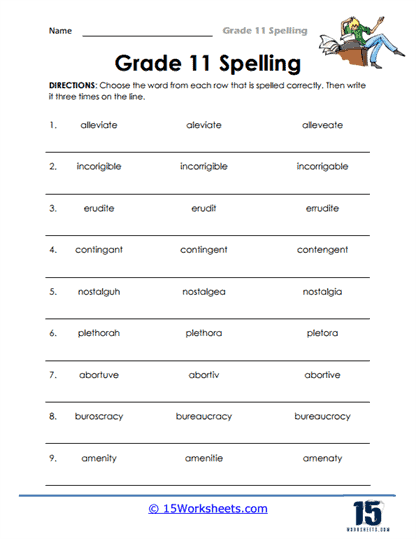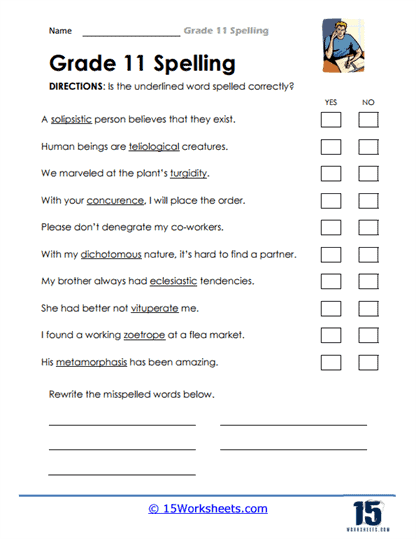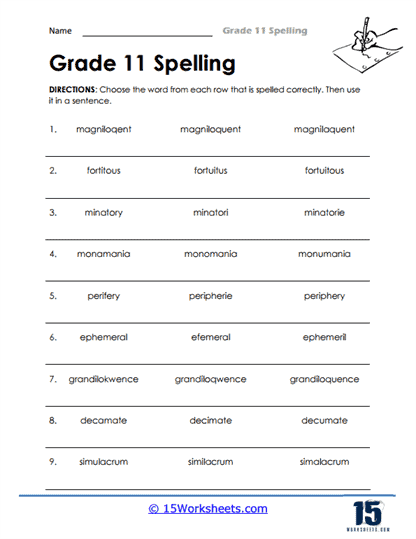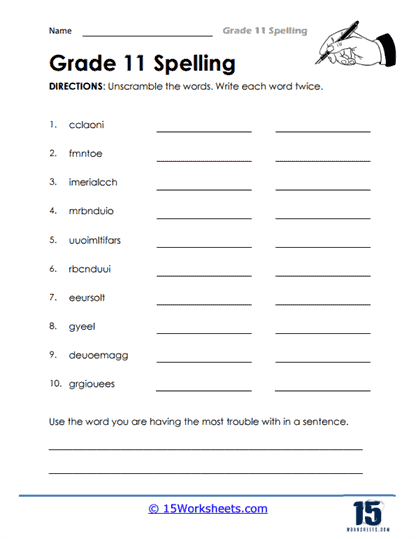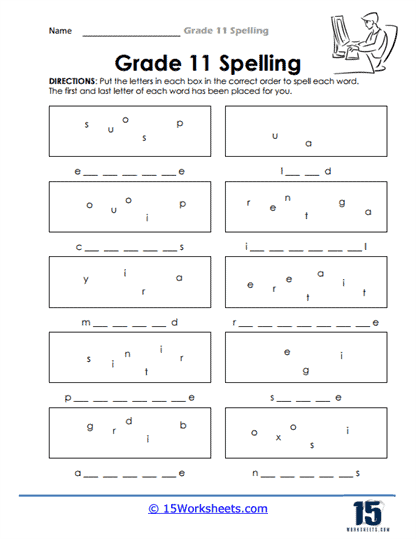Grade 11 Spelling Worksheets
All About These 15 Worksheets
This worksheet series offers an exceptional opportunity for high school students to sharpen their spelling and vocabulary skills through a carefully crafted set of 15 worksheets. Designed to challenge and engage, this resource focuses on advancing students’ proficiency in spelling and language arts, preparing them for the complexities of academic and professional communication.
Each worksheet targets a specific aspect of spelling, structured to help students grasp and master advanced vocabulary. By working through these materials, students will encounter various activities that push them to think critically about the words they use. For example, they will demonstrate their knowledge of complex vocabulary by unscrambling letters to reveal words or identifying missing letters in partially spelled words. Such exercises not only enhance students’ spelling ability but also deepen their understanding of word structure, fostering a more intuitive grasp of language.
The worksheets encourage students to refine their vocabulary through engaging tasks like matching definitions to the correct words. This activity allows students to connect new terms with their meanings, expanding their word bank and improving their ability to recall and use advanced language in appropriate contexts. As they familiarize themselves with more challenging terms, students will build the kind of vocabulary that is essential for success in higher education and beyond.
In addition to vocabulary building, the worksheets include activities that require students to spot and correct misspelled words. This skill is invaluable for developing a strong eye for detail, which will aid them in proofreading their writing for both school assignments and future professional tasks. Correcting spelling errors also helps students internalize spelling rules and patterns, which are often complex at this level. Understanding these patterns will provide them with tools to tackle new words they encounter in their reading or coursework.
Writing practice forms another critical component of this series. Students are tasked with using advanced words in context, which helps reinforce not only their spelling but also their understanding of how these words function within sentences. This practice is essential for language arts proficiency, as it bridges the gap between recognizing a word and using it effectively in writing and conversation. Mastering this skill enables students to express their thoughts more clearly and precisely, a key competency for academic essays, presentations, and future endeavors in any field of study.
The exercises challenge students with intricate spelling patterns and rules, providing them with the necessary practice to navigate and master the complexities of the English language. Whether it’s through deciphering difficult words or applying spelling rules in different contexts, these worksheets are designed to foster linguistic resilience, enabling students to approach new and unfamiliar vocabulary with confidence.
By engaging with this comprehensive series of 15 worksheets, 11th-grade students will not only improve their spelling but also significantly boost their vocabulary and language arts skills. The activities within this series are dynamic and varied, offering ample opportunities for practice and growth. Ultimately, these worksheets are a valuable resource that equips students with the tools they need to become more articulate, confident communicators as they prepare for the demands of higher-level academics and the professional world.
The Most Commonly Misspelled 11th Grade Words
For 11th-grade students, some of the most difficult and commonly misspelled words tend to come from a combination of complex vocabulary, words with tricky spelling patterns, and words borrowed from other languages. At this stage, students encounter more sophisticated terms in their reading and writing, which can present new challenges. Words like “accommodate,” “definitely,” and “recommend” are frequently misspelled because they contain repeated letters or silent letters that are not intuitive. Students may struggle to remember if “accommodate” requires one “m” or two, or whether “recommend” has one “c” or two, leading to frequent errors. Additionally, words like “definitely” often get confused with phonetic variations like “definately,” because the placement of vowels can be counterintuitive.
Another category of difficult words for 11th graders includes those that derive from other languages, such as “entrepreneur,” “rendezvous,” and “embarrass.” Words with French or Latin origins, for example, often have silent letters or unusual combinations of vowels and consonants that make them tricky to spell correctly. These words may not follow the more familiar spelling rules of English, adding another layer of difficulty. For instance, “rendezvous” contains silent letters and an unfamiliar vowel combination, while “entrepreneur” combines a series of vowels that can easily confuse students who are unfamiliar with the word’s etymology.
Finally, homophones-words that sound alike but are spelled differently-can also trip up 11th-grade students. Common examples include “their,” “they’re,” and “there,” as well as “affect” and “effect.” Because these words sound identical or nearly identical when spoken, students may struggle to remember which spelling corresponds to which meaning, especially in more complex writing tasks. Learning the distinctions between these homophones is crucial for students to avoid confusion and convey their intended meaning clearly. Misusing homophones can easily detract from the clarity and professionalism of their writing, which is why mastering these words is essential at this level.
What Are Common Grade 11 Spelling Words?
Common Grade 11 spelling words typically include more advanced vocabulary that is appropriate for high school juniors. These words often appear in literature, science, and social studies texts, as well as standardized tests, such as the SAT or ACT. While the specific list of words may vary by school or curriculum, here are some examples of Grade 11 spelling words:
Aberration
Belligerent
Connoisseur
Debilitate
Ephemeral
Fallacy
Gregarious
Heterogeneous
Impeccable
Juxtaposition
Kudos
Loquacious
Meticulous
Nefarious
Obfuscate
Pernicious
Querulous
Recalcitrant
Sagacious
Trepidation
Ubiquitous
Vehement
Wistful
Xenophobia
Zealous
These words are designed to challenge students’ spelling skills, expand their vocabulary, and enhance their overall language proficiency. Teachers can incorporate these words into classroom lessons or assign activities, such as vocabulary quizzes, worksheets, or writing exercises, to help students practice using them in context. Parents can also support their children’s learning by encouraging them to read widely, which can expose them to a broader range of vocabulary and improve their spelling skills.
Effective Teaching Strategies for Grade 11 Spelling
Effective teaching strategies for Grade 11 vocabulary development involve a blend of direct instruction, interactive activities, and contextual learning. As students tackle more advanced words and linguistic concepts, explicit instruction becomes essential. Educators should focus on teaching word structures, origins, and etymology. A key approach is to emphasize prefixes, suffixes, and root words derived from Latin and Greek, which form the basis of many challenging terms at this level. By understanding the fundamental components of words, students can more easily deconstruct and decipher unfamiliar vocabulary, improving both their word usage and retention. Furthermore, teaching the rules and exceptions of English, such as silent letters and irregular verb forms, provides a solid foundation for mastering more difficult language conventions.
Incorporating interactive and engaging activities is equally important in reinforcing vocabulary and language skills. Instead of relying solely on rote memorization, teachers can integrate games, quizzes, and collaborative group activities that push students to think critically about language. Activities like word scrambles, crossword puzzles, or vocabulary matching exercises help strengthen understanding while keeping the learning process engaging. Peer-to-peer exercises, such as building sentences with newly learned words or working together to define complex terms, promote active learning and allow students to apply their knowledge in meaningful contexts. Additionally, leveraging digital tools such as language apps or online platforms can provide immediate feedback, helping students track their progress and stay motivated as they improve their language proficiency.
Contextual learning plays a crucial role in deepening vocabulary acquisition. By embedding vocabulary instruction within reading and writing assignments, students are able to see how complex words are used in real-world situations. Encountering advanced terminology in literature, academic articles, or even multimedia exposes students to the practical application of words, reinforcing their meaning and usage. Assignments that require students to integrate new vocabulary into essays, creative writing, or oral presentations not only challenge them to use the words correctly but also encourage active engagement with the language. This active use of vocabulary, in turn, leads to a more natural and lasting grasp of the words.
An additional strategy that supports long-term vocabulary mastery is fostering an environment of continuous language exploration. Encouraging students to keep personal vocabulary journals or word banks can help track new terms they encounter in their daily reading or conversations. By consistently reflecting on and revisiting unfamiliar words, students are more likely to internalize these terms and feel more confident using them in their writing and discussions. Moreover, creating opportunities for students to regularly share their expanding vocabulary with peers, through group discussions or class presentations, further reinforces their learning and builds a collaborative learning environment that emphasizes language growth.

